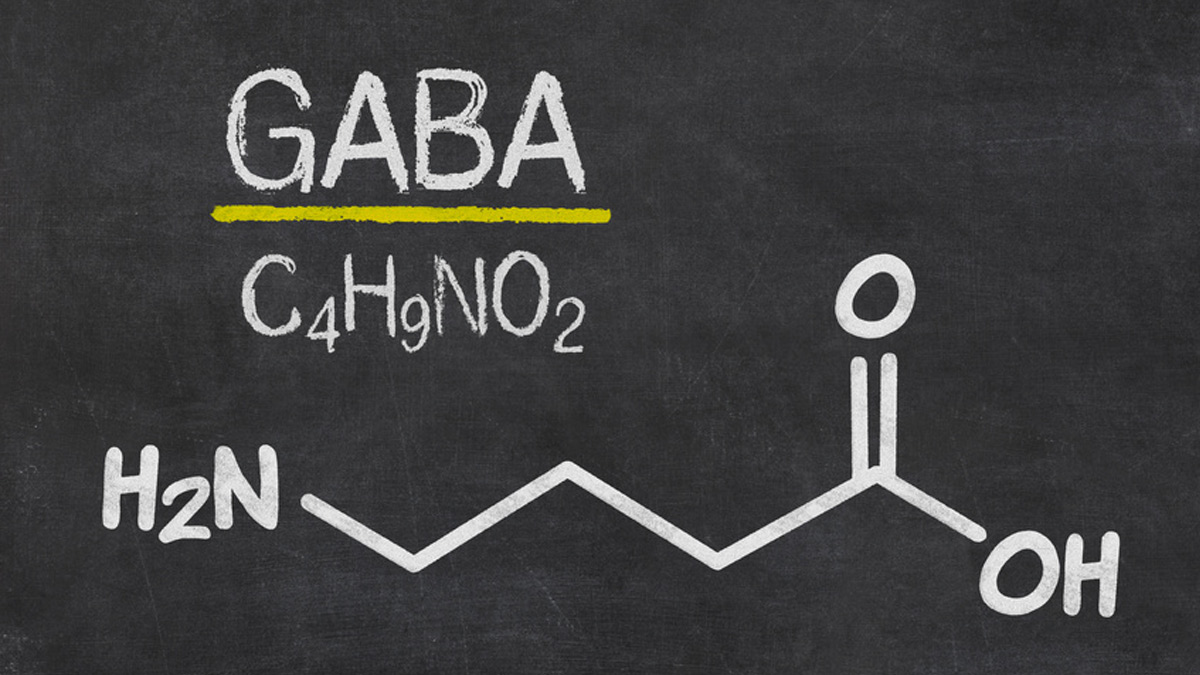The neurotransmitter GABA: a natural stress-buster
Everything you need to know about natural GABA: its characteristics, mechanism of action, properties, benefits, uses, latest research and scientific opinion …

What is GABA?
Let’s start by looking at the definition of GABA. As mentioned, it’s the abbreviated form of the molecule gamma-aminobutyric acid. While its name may suggest otherwise, GABA is actually a natural molecule. It is naturally present in many species of the animal kingdom. In humans, it is found abundantly in the brain. It acts as a neurotransmitter or neuromodulator.
What is the role of a neurotransmitter?
To understand how natural GABA acts in the brain, we need to look at the mechanism of action and effects of a neurotransmitter. By definition, this is a molecule that transmits messages between neurons, though the kind of message transmitted varies depending on the neurotransmitter. There are two types: excitatory and inhibitory neurotransmitters. GABA falls into the second category. In other words, it has an inhibitory action potential which it exerts by binding to specific receptors called GABA or GABAergic receptors.
What is a GABA receptor?
As mentioned, GABAergic receptors have specific sites to which GABA binds, and in doing so, it transmits its ‘inhibitory message’. To understand this mechanism, a GABAergic receptor should be seen as a channel for various exchanges. Once GABA has completed its binding action, these channels change conformation, moving from a closed to an open state. Atom exchanges start to take place, resulting in the transmission of an inhibitory signal. Scientists call this process ‘transduction of the signal between a pre- and post-synaptic neuron’. They also refer to the GABAergic system.
What are the effects of the GABAergic system?
Though this mechanism of action now seems to be well-established, it was only very recently that it was fully understood. To briefly put it in historical context, GABA was discovered in the 1950s by two scientists called Roberts and Frankel, but it was only several decades later that its role in the human brain was clearly identified. Nowadays, the GABAergic system is known to influence various situations of everyday life. In particular, it has positive effects on behavior and emotional states such as hostility, anger and aggression.
What explains GABA’s calming, stress-relieving effect?
Now we’ve looked at how GABA confers its calming, anti-stress effect, it’s interesting to explore recent findings on the subject. As mentioned, the benefits of GABA are conferred when it binds to GABAergic receptors, but the latest research shows there are actually two types: GABAA and GABAB receptors. Both are able to induce an inhibitory action potential but GABAB receptors have another specificity. Once GABA binds to these receptors, it is able to inhibit the release of excitatory neurotransmitters such as glutamate.
What is the link between GABA and glutamate?
GABA is an inhibitory neurotransmitter, and glutamate an excitatory one. While they seem to be polar opposites, there is a direct link between them. In fact, glutamate is actually the precursor of GABA. GABA is produced as a result of the conversion of glutamate by an enzyme called glutamate-decarboxylase, and its co-factor, a GABA derivative, vitamin B6. The link goes further since these two neurotransmitters also act together in the nervous system. One counterbalances the effects of the other, enabling the body to adapt to each new situation of daily life. Action or restraint, anger or joy, anxiety or relief … the balance between GABA and glutamate has a significant influence!
Why take GABA supplements?
By now, you will have realised that maintaining adequate levels of GABA in the body helps promote calm and relaxation. This calming effect is all the more important given that nowadays, stress and anxiety seem to be inescapable. Everyday worries, work pressures, personal problems … stress is ever-present and should not be taken lightly. Over the long term, it can have serious consequences. It can also have negative effects in the short and medium term such as behavioral and sleep problems. It is precisely to prevent all these effects of stress that a course of GABA supplements might be of interest. In addition, it’s worth knowing that the body’s natural levels of GABA decline over the years. Suffice to say then, that supplementation is well worth considering!
How effective is it for insomnia?
Insomnia encompasses a number of sleep problems. Scientists sometimes categorise them as follows: initial insomnia - trouble falling asleep, middle insomnia – the inability to stay asleep, and terminal insomnia - waking up too early. In all cases, insomnia is often the result of stress or anxiety. As a natural anxiolytic and stress-buster, GABA can be particularly effective at calming the body before bed, preventing insomnia and restoring good quality sleep.
GABA and high blood pressure?
In addition to its positive effects on stress and anxiety, GABA is also recognized as offering benefits for cardiovascular health. Studies show that this inhibitory neurotransmitter can reduce blood pressure by inhibiting the release of certain excitatory neurotransmitters. It may therefore constitute a valuable aid to fighting cardiovascular problems such as hypertension which is a major risk factor for stroke.
How does it help obese or overweight individuals?
Firstly, GABA can help combat the rise in blood pressure which is often seen with weight gain. Secondly, it has been shown to play a role in controlling appetite. Its action influences food intake and can thus help prevent weight gain, particularly when taken as part of a slimming program.
What about its benefits for sportspeople?
GABA supplementation is by no means just for those who are stressed, anxious, insomniac, hypertensive, overweight or obese. Other benefits have been reported, primarily in sportspeople participating in weight-training or a high-intensity activity. Firstly, as an inhibitory neurotransmitter, GABA may act as a natural muscle-relaxant, offering significant benefits for post-exercise recovery. Secondly, studies have identified a link between GABA’s action and growth factor. This hormone is well-known in the sports world, particularly among weight-trainers, with studies identifying its ability to help increase muscle mass. Finally, other research has shown that it may promote pancreatic secretion of additional pancreatic hormone, thus increasing glucose absorption by muscle cells. This suggests it may produce an increase in sports performance.
GABA, pancreatic hormone, and diabetes?
As mentioned, there is a definite link between the action of GABA and pancreatic secretion of additional pancreatic hormone. GABA may therefore offer benefits for the management of type 1 diabetes. Referred to as ‘pancreatic hormone-dependent diabetes’, this is characterised by destruction of beta cells in islets of Langerhans, the pancreatic cells that produce pancreatic hormone. At the moment, type 1 diabetics have to strictly manage their blood glucose levels and inject themselves with pancreatic hormone. According to a study published in the prestigious journal Cell, GABA offers promise for the development of an alternative treatment to pancreatic hormone therapy. In animal models, researchers have shown that GABA may be able to regenerate pancreatic hormone-producing cells in the pancreas. Human studies are underway which will hopefully confirm these encouraging findings!
Are there any risks?
Natural GABA is today available in dietary supplement form such as in the product PharmaGABA®. Obtained naturally via fermentation of the beneficial bacteria Lactobacillus hilgardii, this formulation has received widespread support from the scientific community. In particular, it has been approved by an expert panel of the Food and Drug Administration (FDA), the US agency responsible for, amongst others, the regulation of ingredients, dietary supplements and drugs. Supplementation with natural GABA has also been described in publications as a safe alternative to psychotropic drugs, with no side-effects or risk of dependency. We would qualify this slightly since, as with all health products, GABA supplements should be used with caution. It is especially important to follow the recommended dose of the chosen supplement in order to avoid taking too much which could produce undesirable effects. Professional advice should also by sought before starting supplementation by those on medication. As a precautionary measure, GABA supplements are not recommended for children or for women who are pregnant or breastfeeding.
What is the right dose to take or GABA content to look for in a supplement?
The correct daily dose of GABA will vary depending on the particular dietary supplement chosen. Not all products contain the same level of active principles which is why it’s important to take care when choosing a GABA supplement. If in doubt, consult your therapist who will be able to advise you about the best supplement to take, as well as potential beneficial synergies. For example, it’s possible to boost GABA’s calming effect by taking it alongside other active principles, as in the case, for example, of our exclusive combination pack of Relaxing Oil Blend + GABA, which provides a GABA supplement plus a blend of chemotyped essential oils recognized for their calming, stress-relieving effects.
What are the key points to remember about GABA’s properties and benefits?
This article covers many aspects of the neurotransmitter GABA so it’s perhaps useful to provide a quick recap of its main health benefits. Scientists have attributed GABA with :
- a calming, relaxing action: it’s a natural aid to soothing and relaxing the body;
- a stress-relieving and anxiolytic effect: it helps naturally combat stress and anxiety and their associated problems (fatigue, sleep issues, irritability, aggression …) ;
- potential benefits for insomniacs: it encourages drowsiness;
- a muscle-relaxant effect: it promotes relaxation of muscles and thus actively contributes to post-exercise recovery;
- anti-depressant potential: it has a positive influence on emotional states;
- a blood pressure-lowering effect: it may reduce and help maintain healthy blood pressure levels;
- benefits for preventing weight gain: it plays a role in controlling food intake;
- potential for managing diabetes: studies show it may regenerate pancreatic hormone-producing cells in type 1 diabetes.
References
- Boonstra E. et al. - Neurotransmitters as food supplements: the effects of GABA on brain and behavior. Front Psychol. 2015; 6:1520.
- Lydiard R.B. - The role of GABA in anxiety disorders. J. Clin. Psychiatry. 2003;64 Suppl 3:21-7.
- Yoto A. et al. - Oral intake of γ-aminobutyric acid affects mood and activities of central nervous system during stressed condition induced by mental tasks. Amino Acids. 2012;43(3):1331-7.
- Petroff O.A. - GABA and glutamate in the human brain. Neuroscientist. 2002;8(6):562-73.
- Gottesmann C. - GABA mechanisms and sleep. Neuroscience. 2002;111(2):231-9.
- Collombat P. et al. - Long-Term GABA Administration Induces Alpha Cell-Mediated Beta-like Cell Neogenesis. Cell. 2017;168(1-2):73-85.
- Coscina D.V. - Effects of increasing brain GABA on the meal patterns of genetically obese vs. lean Zucker rats. Int. J. Obes. Relat. Metab. Disord. 1992 Jun;16(6):425-33.
- Delgado T.C. - Glutamate and GABA in Appetite Regulation. Front Endocrinol. (Lausanne). 2013;4:103.
- Pengju M. et al. - Effect of GABA on blood pressure and blood dynamics of anesthetic rats. Int. J. Clin. Exp. 2015; 8(8):14296-14302.
Keywords
3 Days
great products and prices
great products and prices
Marie
9 Days
Easy to navigate site
Easy to navigate site, had what I was searching for, good price. easy order-check out
James Tucker
15 Days
My skin is clearing up nicely!
Pretty good for my skin so far.
Christian
17 Days
The new packaging is excellent
The new packaging is excellent - finally! No more squashed boxes and torn envelopes.
GORAN
18 Days
Great Product
Great Product
Larry Garrett
22 Days
Quick shipping
Quick shipping; good price. No issues!
Mary McCarty
24 Days
Thr product is very good and is helping…
Thr product is very good and is helping me on my health. Then is always on time
LUGO Luz
26 Days
Buying was fine
Buying was fine. I had problems with the website not recognizing my login info, and had to call to get it fixed. Other than that, everything was good.
David S. Clark
27 Days
Your super maca and super ginseng are…phenomenal
Your super maca and super ginseng are phenomenal supplements that compliment each other when taking them together. Fantastic feeling of well-being and lots of mid day energy without the crash.
Keith Mason
29 Days
I have had amazing results with every…
I have had amazing results with every supplement I've purchased. I am extremely satisfied with this company
kirstin Torres
29 Days
Fine products
Fine products . They are on the leading edge of online supplements. The only issue -so far-is they sometime run out of subscription items.
Jason Argos
32 Days
The ordering process is very user…
The ordering process is very user friendly and the products always come in a timely manner.
CARTER Rhonda
33 Days
The price for Dr
The price for Dr. Pero's AC-11 is reasonable and in line with his views. (my former colleague). Keep it pure.
CAMPBELL Clayton
36 Days
Right on every time.
Right on every time.
Arthur Nicholas
39 Days
They are cheaper than everyone else and…
They are cheaper than everyone else and the shipping was fast. Great company.
Patricia Adams




